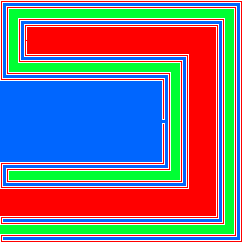|
Indecomposability (other)
{{disambig ...
Indecomposability or indecomposable may refer to any of several subjects in mathematics: * Indecomposable module, in algebra * Indecomposable distribution, in probability * Indecomposable continuum, in topology * Indecomposability (intuitionistic logic), a principle in constructive analysis and in computable analysis * Indecomposability of a polynomial in polynomial decomposition * A property of certain ordinals; see additively indecomposable ordinal In set theory, a branch of mathematics, an additively indecomposable ordinal ''α'' is any ordinal number that is not 0 such that for any \beta,\gamma<\alpha, we have Additively indecomposable ordi ... [...More Info...] [...Related Items...] OR: [Wikipedia] [Google] [Baidu] |
Indecomposable Module
In abstract algebra, a module is indecomposable if it is non-zero and cannot be written as a direct sum of two non-zero submodules. Jacobson (2009), p. 111. Indecomposable is a weaker notion than simple module (which is also sometimes called irreducible module): simple means "no proper submodule" N < M, while indecomposable "not expressible as ". A direct sum of indecomposables is called completely decomposable; this is weaker than being , which is a direct sum of s. A direct sum decomposition of a module into indecomposable modules is called an |
Indecomposable Distribution
In probability theory, an indecomposable distribution is a probability distribution that cannot be represented as the distribution of the sum of two or more non-constant independent random variables: ''Z'' ≠ ''X'' + ''Y''. If it can be so expressed, it is decomposable: ''Z'' = ''X'' + ''Y''. If, further, it can be expressed as the distribution of the sum of two or more independent ''identically'' distributed random variables, then it is divisible: ''Z'' = ''X''1 + ''X''2. Examples Indecomposable * The simplest examples are Bernoulli-distributeds: if ::X = \begin 1 & \text p, \\ 0 & \text 1-p, \end :then the probability distribution of ''X'' is indecomposable. :Proof: Given non-constant distributions ''U'' and ''V,'' so that ''U'' assumes at least two values ''a'', ''b'' and ''V'' assumes two values ''c'', ''d,'' with ''a'' < ''b'' and ''c'' < ''d'', then ''U'' + ''V'' ass ... [...More Info...] [...Related Items...] OR: [Wikipedia] [Google] [Baidu] |
Indecomposable Continuum
In point-set topology, an indecomposable continuum is a continuum that is indecomposable, i.e. that cannot be expressed as the union of any two of its proper subcontinua. In 1910, L. E. J. Brouwer was the first to describe an indecomposable continuum. Indecomposable continua have been used by topologists as a source of counterexamples. They also occur in dynamical systems. Definitions A ''continuum'' C is a nonempty compact connected metric space. The arc, the ''n''-sphere, and the Hilbert cube are examples of path-connected continua; the topologist's sine curve and Warsaw circle are examples of non-path-connected continua. A ''subcontinuum'' C' of a continuum C is a closed, connected subset of C. A space is ''nondegenerate'' if it is not equal to a single point. A continuum C is ''decomposable'' if there exist two nondegenerate subcontinua A and B of C such that A \neq C and B \neq C but A \cup B = C. A continuum that is not decomposable is an ''indecomposable continuum''. ... [...More Info...] [...Related Items...] OR: [Wikipedia] [Google] [Baidu] |
Indecomposability (intuitionistic Logic)
In intuitionistic analysis and in computable analysis, indecomposability or indivisibility (german: Unzerlegbarkeit, from the adjective ''unzerlegbar'') is the principle that the continuum cannot be partitioned into two nonempty pieces. This principle was established by Brouwer in 1928 English translation of §1 see p.490–492 of: using intuitionistic principles, and can also be proven using Church's thesis. The analogous property in classical analysis is the fact that every continuous function from the continuum to is constant. It follows from the indecomposability principle that any property of real numbers that is ''decided'' (each real number either has or does not have that property) is in fact trivial (either all the real numbers have that property, or else none of them do). Conversely, if a property of real numbers is not trivial, then the property is not decided for all real numbers. This contradicts the law of the excluded middle, according to which every propert ... [...More Info...] [...Related Items...] OR: [Wikipedia] [Google] [Baidu] |
Polynomial Decomposition
In mathematics, a polynomial decomposition expresses a polynomial ''f'' as the functional composition g \circ h of polynomials ''g'' and ''h'', where ''g'' and ''h'' have degree greater than 1; it is an algebraic functional decomposition. Algorithms are known for decomposing univariate polynomials in polynomial time. Polynomials which are decomposable in this way are composite polynomials; those which are not are indecomposable polynomials or sometimes prime polynomials J.F. Ritt, "Prime and Composite Polynomials", ''Transactions of the American Mathematical Society'' 23:1:51–66 (January, 1922) (not to be confused with irreducible polynomials, which cannot be factored into products of polynomials). The degree of a composite polynomial is always a composite number, the product of the degrees of the composed polynomials. The rest of this article discusses only univariate polynomials; algorithms also exist for multivariate polynomials of arbitrary degree. Examples In the simpl ... [...More Info...] [...Related Items...] OR: [Wikipedia] [Google] [Baidu] |
